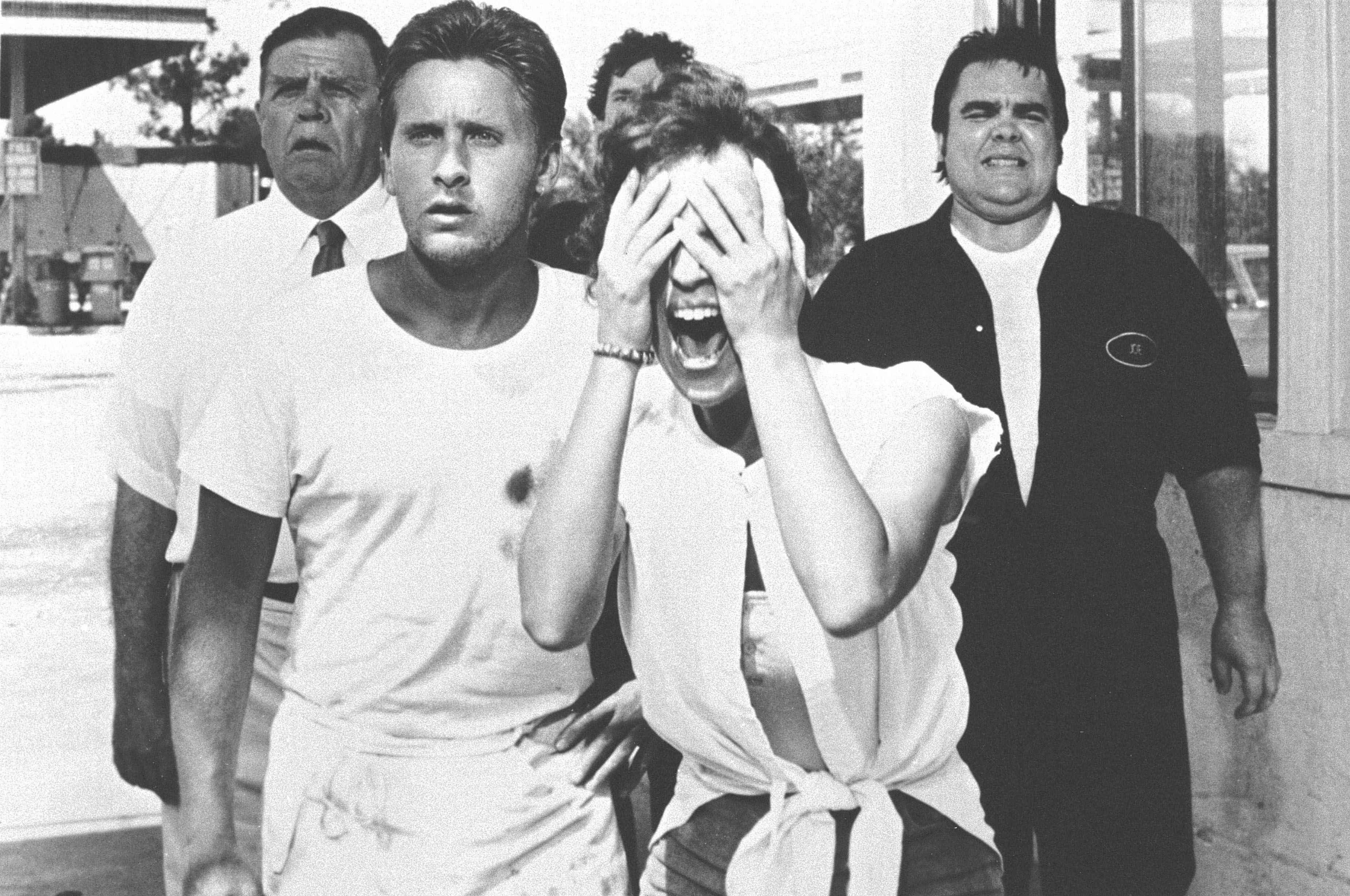Why Stephen King failed to make a great Stephen King movie
Maximum Overdrive is really bad. But it's 100 percent Stephen King's movie.


A free daily email with the biggest news stories of the day – and the best features from TheWeek.com
You are now subscribed
Your newsletter sign-up was successful
Hollywood has made more than 50 movies and TV shows based on Stephen King's books and stories. The first — Brian De Palma's voluptuous Carrie — turns 40 this year, while the newest, Cell, made 10 years after the novel came out, is available for you to ignore on On Demand. But of all these movies based on King's work, King has only ever directed one film himself, Maximum Overdrive (1986), which he adapted from his story "Trucks."
"Trucks" is not one of King's career highlights, and his decision to use it for his directorial debut befuddles and beguiles. It's like he chose the worst story that would be hardest to film just for the challenge.
In the movie, as in the story, machines come to life and start killing people. Not just trucks, either: Lawnmowers, meat carvers, and arcade games all take turns maiming and mangling. (One almost wishes they would remake the movie today so we could see what insidious things Tinder and Pokemon Go would do.) The people, in turn, make invariably poor decisions that allow the machines to kill them with ease, such as, but not limited to, standing in the path of an evil 18-wheeler.
The Week
Escape your echo chamber. Get the facts behind the news, plus analysis from multiple perspectives.

Sign up for The Week's Free Newsletters
From our morning news briefing to a weekly Good News Newsletter, get the best of The Week delivered directly to your inbox.
From our morning news briefing to a weekly Good News Newsletter, get the best of The Week delivered directly to your inbox.
King set out to make the best Stephen King movie. He now considers it the worst film made of his works. But the movie is something more significant: It's the most Stephen King-y movie ever made.

Collectively, the first six films adapted from King's works — De Palma's Carrie, Stanley Kubrick's The Shining, George Romero's Creepshow, Lewis Teague's Cujo, David Cronenberg's The Dead Zone, and John Carpenter's Christine — suggested that King's oeuvre might be the most cinematic-apt body of work by a popular fiction writer. But, save for the listless Cujo, all of these films are undoubtedly the children of their auteurs, rather than Stephen King Movies™. They're adoptions rather than just adaptations. (The same goes for Tobe Hooper's great 1979 TV miniseries Salem's Lot, which is imbued with Hooper's love for vampire movies and Hitchcock; its influence on vampire movies is arguably as profound as King's novel.) King wrote and acted (badly) in Creepshow, which is hella fun, but with its EC Comics aesthetic and tar-black sense of humor, it's a Romero version of a King movie; the 1987 sequel, which Romero didn't direct, is so bland and forgettable I can't even think of a witty insult for it.
With Maximum Overdrive, King tried to make an undiluted Stephen King movie. No pretentious stylists with their fancy cinematic chicanery, like De Palma; no missing the point, like Kubrick — just King doing King, baby. The movie has all the traits and tropes of a Stephen King work, despite being inexplicably set in North Carolina instead of Maine. The unnecessarily detailed explanation as to why machines are massacring people immediately announces the film's 1950s sci-fi roots: On June 19, 1987, the Earth passed through the "extraordinarily diffuse tail" of a comet, specifically a comet named Rhea-M, enveloping the planet in a noxious green veil that... you know, it doesn't really matter. People are gonna die.
The movie wants to be a camp comedy. King himself plays the first character we meet. (An ATM calls him "an asshole." He is not a good actor.) A soda machine spits cans at a Little League team, knocking 'em down like targets in an amusement park game. (Killing kids is a taboo that King has never shied away from.) In an almost-creepy scene, an empty ice cream truck prowls a tranquil suburban neighborhood, balmy skies above and well-manicured front lawns littered with dead bodies all around. It's the most King-y scene of the movie, and wouldn't be out of place in The Regulators or It or any of his first four short story collections. King gives us a barrage of silliness, from a Bible salesman oblivious to the truck barreling down towards him to a sketchy diner proprietor wielding a bazooka.
A free daily email with the biggest news stories of the day – and the best features from TheWeek.com
But after 40 minutes, the movie already starts spinning its wheels. King's meandering and verbosity on the page doesn't work as well on the big screen as it does in a fat, broken-spined paperback. A cavalcade of King's fetishes and affinities runs through the movie. AC/DC, his favorite band, provides the film's score, all squelching, overdriven guitars and percussive power chords chugging away with the finesse of a Mack Truck on black ice. Close-ups replicate King's penchant for details, the camera lingering on buttons and levers and feet and brand logos, all that minutiae that roots his novels in specific times and places. Blood is the color of candy apples and people say things like "sugarbuns" and "I don't give a ladybug!"
King's influence pervades pop culture. The creeps and creatures he's created are embedded in our lexicon, burrowed as deeply as a cockroach infestation waiting to pour out of E. G. Marshall's mouth. Even the sharp font of his '80s novels was borrowed for the Netflix series Stranger Things, a show that seems to have grown up reading King's novels. Given how passionately King loves and understands horror, it's funny that he doesn't quite know how to make a good horror movie. He's concerned with making his movie, a Stephen King movie. If nothing else, Maximum Overdrive is an unintentional exegesis on how much Stephen King's legacy owes to the filmmakers who change his works for their film, how artists draw from other artists when creating their own art. Even if he doesn't love the results, Uncle Stevie can probably appreciate that.
Greg Cwik is a writer and editor. His work appears at Vulture, Playboy, Entertainment Weekly, The Believer, The AV Club, and other good places.
-
 What to know before filing your own taxes for the first time
What to know before filing your own taxes for the first timethe explainer Tackle this financial milestone with confidence
-
 The biggest box office flops of the 21st century
The biggest box office flops of the 21st centuryin depth Unnecessary remakes and turgid, expensive CGI-fests highlight this list of these most notorious box-office losers
-
 The 10 most infamous abductions in modern history
The 10 most infamous abductions in modern historyin depth The taking of Savannah Guthrie’s mother, Nancy, is the latest in a long string of high-profile kidnappings
-
 Walter Isaacson's 'Elon Musk' can 'scarcely contain its subject'
Walter Isaacson's 'Elon Musk' can 'scarcely contain its subject'The latest biography on the elusive tech mogul is causing a stir among critics
-
 Welcome to the new TheWeek.com!
Welcome to the new TheWeek.com!The Explainer Please allow us to reintroduce ourselves
-
 The Oscars finale was a heartless disaster
The Oscars finale was a heartless disasterThe Explainer A calculated attempt at emotional manipulation goes very wrong
-
 Most awkward awards show ever?
Most awkward awards show ever?The Explainer The best, worst, and most shocking moments from a chaotic Golden Globes
-
 The possible silver lining to the Warner Bros. deal
The possible silver lining to the Warner Bros. dealThe Explainer Could what's terrible for theaters be good for creators?
-
 Jeffrey Wright is the new 'narrator voice'
Jeffrey Wright is the new 'narrator voice'The Explainer Move over, Sam Elliott and Morgan Freeman
-
 This week's literary events are the biggest award shows of 2020
This week's literary events are the biggest award shows of 2020feature So long, Oscar. Hello, Booker.
-
 What She Dies Tomorrow can teach us about our unshakable obsession with mortality
What She Dies Tomorrow can teach us about our unshakable obsession with mortalityThe Explainer This film isn't about the pandemic. But it can help viewers confront their fears about death.
